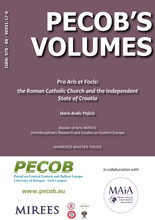and Balkan Europe
by IECOB & AIS Università di Bologna

Pro Aris et Focis: the Roman Catholic Church and the Independent State of Croatia
by: Haris Avdic Pejicic
pp: 83
ISBN: 978-88-96951-17-0
In collaboration with:
MIREES Alumni International Association (MAiA)

Abstract
This thesis examines the behaviour of the Catholic Church in Croatia and Bosnia and Herzegovina during World War II. Political regimes will usually seek for internal legitimisation from religious institutions. From Franco’s nacionalcatolicismo to the relation between radical Indian nationalism and Hinduism, examples can be found all over the world in any historical period. In the case of Christian denominations in Europe, World War II blatantly stands as the black spot. Christian churches were not able to prevent or stop the bloodshed when it started: few of them publicly condemned the Shoah, and even less took an active role in stopping the violation of the Sixth Commandment.
This legitimation process becomes even more substantial when religious institutions are depicted as foremost representatives of national identity – as it is the case of the Catholic Church and the Croat national ethos. Catholicism had almost no relevance in Croatian identity politics in the first half the nineteenth century. It gained significance during the Yugoslav kingdom, when both national and religious struggles against Serb domination became entrenched. The Catholic Church granted legitimacy to Pavelić’s ustaša regime until May 1945 in exchange for privileges. The level of collaboration varied from actual involvement
to implicit acceptance of the regime’s actions.
This project will analyse why the Catholic Church in Croatia acted the way it did during World War II. The main assumption is that the Catholic Church collaborated with Pavelić’s regime in a form of double repayment process; i.e. the Catholic Church repaid the ustaša regime for the economic and social privileges granted, whilst the ustaše obtained a robust form of political legitimation vis-à-vis the Croatian people in return. As the incarnation of Croatdom, the Church had to collaborate with a regime that, despite everything, had given Croatia the independence it had pined for so long. Thus, it is necessary to understand how, in what ways, and to what extent the Catholic Church collaborated in Croatia to properly address the research question carried forward in this work.
This thesis will therefore attempt to give a thorough explanation of the way the Roman Catholic Church acted in the Independent State of Croatia (NDH) in the period between 1941 and 1945, trying to understand whether the behaviour of the Church did during World War II developed in the fashion it did in order to not to alienate itself from the Croatian government and from the Croatian people, or the Church’s actions were the reflection of its own volition.
Keywords
Catholic Church; ustaše; Croatia; Bosnia-Herzegovina; ethnic conflict; World War II
Table of contents
Abstract
Keywords
Introduction
All Croats are Catholics! – are they? Roman Catholicism and
Croatian national identity
A bittersweet experience: the Catholic Church and the
Yugoslav kingdom
A Fight pro aris et focis: World War II and the Croatian Church
Thorny relations: the Vatican and the NDH
Conclusion
Appendix
Bibliography
Author’s Biography
PECOB’S VOLUME: SELECTED MIREES MASTER THESES
The initiative of:
University of Bologna, Vytautas Magnus at Kaunas, Corvinus of Budapest and St. Petersburg State University, together with University of Ljubljana and University of Zagreb
In collaboration with:
MIREES Alumni International Association (MAiA)
Institute for Central-Eastern and Balkan Europe (IECOB)
Selection coordinated by:
MIREES Faculty Academic Council
Editorial coordination by:
Prof. Francesco Privitera, MIREES Programme Director
Adriano Remiddi, President of the MAiA Executive Board
Giovanni Cadioli, MAiA Editorial Manager
Luciana Moretti, IECOB Editorial Assistant
PECOB: Portal on Central Eastern and Balkan Europe - University of Bologna - 1, S. Giovanni Bosco - Faenza - Italy
Chiudi la versione stampabile della pagina e ritorna al sito.
 Download the Thesis
Download the Thesis